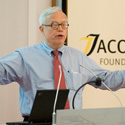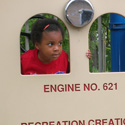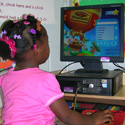The Study Continues
The initial gains the Perry children made also faded out. By the late 1960s, the high hopes that preschool could really change things for poor, black children seemed like a misguided dream from another era.
But the Perry researchers kept their study going as the children moved through elementary school. And they started to notice something interesting. The preschool children were doing better in school. They were still no "smarter" than their peers as measured on IQ tests, but they were less likely to be assigned to special education, and less likely to have behavior problems.
And the surprises kept coming. In high school, the students who had gone to preschool got better grades, they spent more time on their homework, they scored slightly higher on achievement tests, and they were more likely to say school was important to them. There were still no differences between them and the students who had not gone to preschool when it came to IQ, but in all kinds of other measurable ways, the students who had gone to preschool were doing better.
Researchers didn't know exactly why the preschool students were doing better, but it appeared they were more motivated - they wanted to do well. For example, one reason they did better on achievement tests is because they were more likely to finish the tests. The students who had not gone to preschool left more questions blank. They didn't even try.
"Now you're getting into something really deep," says economist James Heckman. "How is it that motivation is affected? What causes motivation?"
Heckman is a Nobel laureate who teaches at the University of Chicago. Preschool was not among his interests until he came across the Perry Study several years ago. What caught his attention is the apparent paradox at its core: The people who went to preschool were not "smarter" than their peers, but they did better.
"It's true that IQ wasn't raised by the study," Heckman says. "But it is true that achievement was. And I thought that was amazing."
The assumption at the heart of a lot of economic theory is that measured intelligence is the key to everything. But with the Perry Preschool children, something else made the difference. It was not IQ. Heckman is now working with psychologists to try to understand how the preschool may have affected the development of what he calls "non-cognitive" skills, things like motivation, sociability and the ability to work with others.
These are critical skills that help people succeed at school, at work - and in life.
And as it turns out, the Perry preschool children did do better in life
By the time study participants were 40 years old, the differences between the people who went to preschool and the people who didn't were startling.
The people who'd gone to preschool were more likely to be employed; they made more money. They were more likely to own homes and cars, to have savings accounts. They were more than twice as likely to say they had positive relationships with their families. The men who'd gone to preschool were more involved in raising their children. And the biggest difference of all had to do with crime.
The people who had gone to preschool had far fewer problems with the law. They were half as likely to be arrested. In other words, preschool cut the crime rate in half.
By cutting crime and sending fewer children to special education, the preschool saved society a lot of money. That got economists and business people interested in the Perry Preschool. They like Perry because it makes economic sense. Investing in preschool pays off.
The total cost of the program was $15,166 per child (adjusted for inflation from 1962 dollars to 2000 dollars). The return to society on that initial investment was $244,812 per child.
Preschool is a "social program from which everybody wins," says economist Steven Barnett, director of the Institute for Early Education Research. Good for the kids, and good for the taxpayers too.
Preschool Today
Now states are rapidly expanding public preschool programs. State spending on preschool has nearly doubled in the last five years. More than 80 percent of American 4-year-olds go to some kind of preschool.
Everyone is hoping for the dramatic results - and the financial savings - the Perry Preschool achieved. But those results may be threatened by another movement in American education: the testing movement.
In recent years, education policy has come to be dominated once again by the immediate need to raise test scores. And preschool supporters fear that tests don't measure important things that preschool teaches children - how to get along in school, how to be curious, how to try hard. They say preschools are being pushed to "teach to the test" and that preschool will become too much like what kindergarten has become.
"Children now spend far more time being taught and tested on literacy and math skills than they do learning through play and exploration, exercising their bodies, and using their imaginations," write the authors of a recent report on how kindergarten has changed in recent years.
Preschool supporters worry that preschool is becoming too much like schools for older children, and not enough like the Perry Preschool.
And economist James Heckman worries too. He has analyzed the Perry Preschool results and published several papers. He believes the Perry Preschool helped children develop a set of what he calls "non-cognitive" skills - things like sociability, the ability to work with others, the ability to focus on tasks. His says these skills are crucial for success in school, and in life.
But he says schools don't focus enough on helping students develop "non-cognitive" skills. Those skills are seen as soft, squishy, too hard to quantify. He says schools today are too focused on cognitive skill testing much the way they were too focused on IQ 50 years ago. And the lesson of the Perry Preschool is that doing well in school, and in life, is about more than a test score.
Back to Early Lessons.










